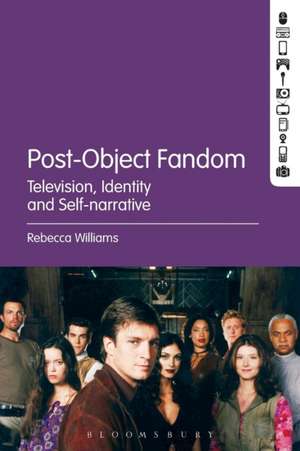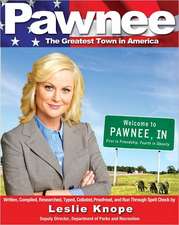Post-Object Fandom: Television, Identity and Self-narrative
Autor Rebecca Williamsen Limba Engleză Paperback – 27 iul 2016
| Toate formatele și edițiile | Preț | Express |
|---|---|---|
| Paperback (1) | 256.85 lei 6-8 săpt. | |
| Bloomsbury Publishing – 27 iul 2016 | 256.85 lei 6-8 săpt. | |
| Hardback (1) | 773.39 lei 6-8 săpt. | |
| Bloomsbury Publishing – 25 mar 2015 | 773.39 lei 6-8 săpt. |
Preț: 256.85 lei
Preț vechi: 330.86 lei
-22% Nou
Puncte Express: 385
Preț estimativ în valută:
49.16€ • 53.42$ • 41.32£
49.16€ • 53.42$ • 41.32£
Carte tipărită la comandă
Livrare economică 21 aprilie-05 mai
Preluare comenzi: 021 569.72.76
Specificații
ISBN-13: 9781501319983
ISBN-10: 1501319981
Pagini: 248
Dimensiuni: 152 x 229 x 13 mm
Greutate: 0.33 kg
Ediția:NIPPOD
Editura: Bloomsbury Publishing
Colecția Bloomsbury Academic
Locul publicării:New York, United States
ISBN-10: 1501319981
Pagini: 248
Dimensiuni: 152 x 229 x 13 mm
Greutate: 0.33 kg
Ediția:NIPPOD
Editura: Bloomsbury Publishing
Colecția Bloomsbury Academic
Locul publicării:New York, United States
Caracteristici
Explores a range of subjects including: identity, cultural value, issues of distinction and power, genre
Notă biografică
Rebecca Williams is a Senior Lecturer in Communication, Cultural and Media Studies at the University of South Wales. She has published on television fans and audiences in journals including Continuum, Popular Communication, Television & New Media, Popular Music & Society, and Participations and recently edited Torchwood Declassified: Investigating Mainstream Cult Television (2013).
Cuprins
Acknowledgements Chapter OneIntroduction: The beginning of the end Chapter TwoOntological security, self-identity and post-object fandom Chapter ThreeDepartures, deaths and replacements: When characters leave Chapter Four'The constant in my life': The reiteration discourse Chapter Five'Turning off the life support': The rejection discourse Chapter SixMoving on?: The renegotiation discourse Chapter Seven'Living in DVD-land': Post-object fandom, re-watching, and digital media Chapter EightContinuing the Show: Interim fandom, resurrections, fan-created texts Chapter NineConclusion: Immortal fandom Index
Recenzii
In this erudite and absorbing study, Rebecca Williams argues that endings are a crucial starting place for understanding fandom. A must read for fans and scholars alike, Post-Object Fandom makes a significant contribution to fan and media scholarship with its strong theoretical background and emphasis on moments of transition in fan identity. Eschewing a typical single fandom analysis, Williams uses a multi-fandom approach to reveal the universality of finality. From regeneration to resurrection, this is a book about conclusions that you won't want to end.
Rebecca Williams's Post-Object Fandom uses the idea of endings to expertly interrogate the deeply personal relationships fans can have with TV series and their characters. This important contribution to fan studies brings together philosophical, psychological, and textual concerns, all explored through the specific lens of fan responses to endings. Her focus on one particular aspect of the shows allows her to broaden her theoretical and practical inquiries as she offer important insights into varied fan responses. Her wide-ranging examples and methods allow her findings to amend existing investigations into fan identities.
An important contribution to fan studies, audience studies, and television studies in the digital age, this book explores how devoted viewers deal with TV shows' (un)intentional endings, transmedia continuations, and uncertain industry hiatuses. Always inspired and acute in her analysis, Rebecca Williams tackles a range of case studies from Doctor Who to Friends to The West Wing. Post-Object Fandom is such a good read, you simply won't want it to end.
Rebecca Williams's Post-Object Fandom uses the idea of endings to expertly interrogate the deeply personal relationships fans can have with TV series and their characters. This important contribution to fan studies brings together philosophical, psychological, and textual concerns, all explored through the specific lens of fan responses to endings. Her focus on one particular aspect of the shows allows her to broaden her theoretical and practical inquiries as she offer important insights into varied fan responses. Her wide-ranging examples and methods allow her findings to amend existing investigations into fan identities.
An important contribution to fan studies, audience studies, and television studies in the digital age, this book explores how devoted viewers deal with TV shows' (un)intentional endings, transmedia continuations, and uncertain industry hiatuses. Always inspired and acute in her analysis, Rebecca Williams tackles a range of case studies from Doctor Who to Friends to The West Wing. Post-Object Fandom is such a good read, you simply won't want it to end.








